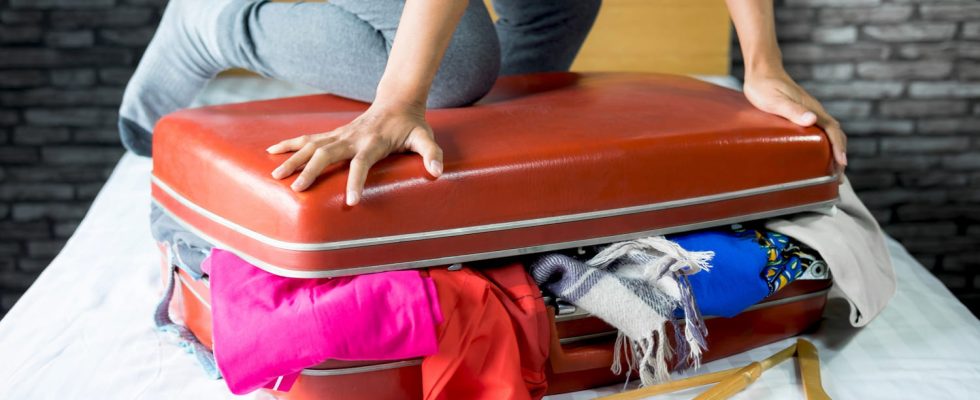“You never know”, “in case I need it”. Each vacation, we take much more than what we need in our suitcase. And this behavior can say a lot about our personality.
The way in which one packs a suitcase is not insignificant and in certain aspects it is a true mirror of who we are. “We always put a little “self” in our suitcase. In addition to the rational things that we really need when we go on vacation (sunscreen, swimsuit…)the suitcase represents a summary of his tastes, his needs, his desires, like an extension of his house…“, confirms Maite Tranzer, a clinical psychologist, whom we interviewed on this subject. From its design to its contents, the suitcase says a lot about our personality. “The notion of temporality already gives indications on our way of anticipating things and on its management of stress. For example, the fact of preparing your luggage well in advance marks the point of safety with regard to risk-taking and reveals a need for controlwhile the fact of packing at the last minute suggests a greater ability to let go“, continues the expert. contents of the suitcase also reveals something:
► Baggage loaded with affect are reassuring and allow you to find a cocoon when you leave the landmark of your home. They play a role oftransitional objects which make the link between a place of refuge and an unknown place. “But beware, taking the things that are important to us also means taking the risk of losingduring the stay, objects of great sentimental value“, emphasizes Maïté Tranzer.
► Maximal or overflowing luggage raise a fear of missing out. Some people take more than necessary to reassure themselves and serenity. It’s an excessive and irrational way of anticipating the holidays and palliating any unforeseen events. It is the famous “overfilled suitcase”. “This behavior also raises the fear of making bad choicesto be wrong or to fail in some way, and by extension the fear of disappointing (oneself), of feeling guilty, of judging oneself negatively or fear of other people’s eyes (“I didn’t wear the right outfit” for example), which can ruin the holidays“, describes the psychologist.
► Baggage contents also depends on the emotional state in which one develops his suitcase. “Do we prepare our suitcase in joy, sadness, stress? For example, bringing festive or evening clothes reflects a certain letting go. Bringing books or work is a way to ease your conscience.“, continues our expert.
► Pack your suitcase for people other than yourself, such as his children or his spouse can induce a additional stress because “maybe packing for someone else source of conflict and guilt. Do we seek to be irreproachable in the eyes of those close to us? What value do we give ourselves if we miss the suitcase or if we forget something? Can we trust ourselves enough in the choice of such and such a thing? So many questions that can initiate introspective work“.
“Trying to master the manageable parameters”
From the moment the suitcase represents a source of anxiety, it is advisable to find serenity. “We must try to trust each other and take a step back compared to what we take and what we leave at home. The idea is to detach oneself from one’s choices, to let goof play it down if you forget things and tell yourself that at worst, you can buy them back on the spot if we can’t do without”, recommends our interlocutor. Eventually, few things are vital and it can be a good exercise to increase their ability to adapt. Also, controlling controllable parameters such as weather reportthe type of activity you are going to do there and find out about the services offered by the accommodation (washing machine, etc.) better understand the stay and to limit the stress that the development of a suitcase can represent.
Thanks to Maïté Tranzer, clinical psychologist.
